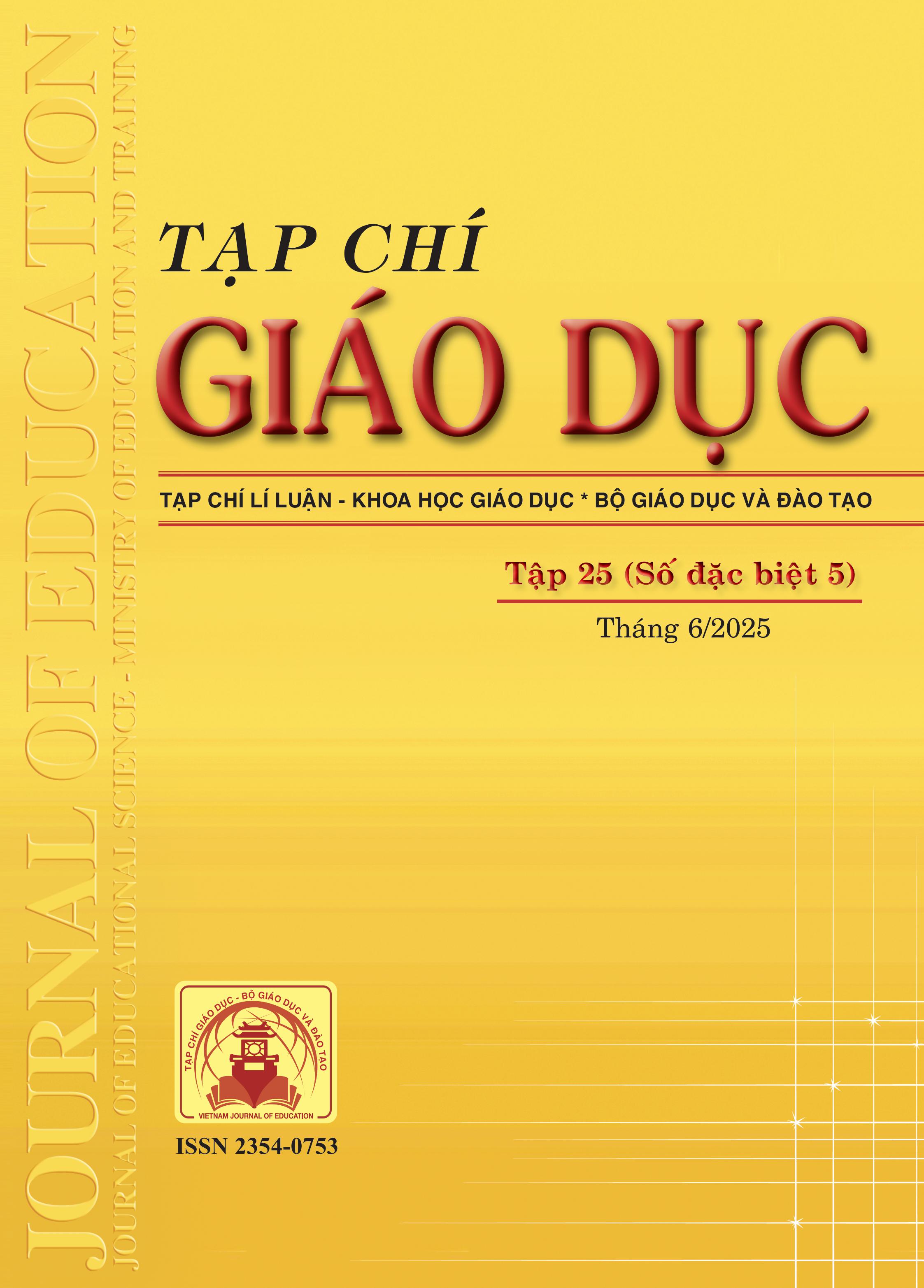Đánh giá sự phát triển tư duy khái quát hóa qua trò chơi toán học ở trẻ 5-6 tuổi: Một nghiên cứu lí luận
Tóm tắt
Generalization thinking is a fundamental cognitive skill that should be nurtured from an early age to form the foundation for academic reasoning and problem-solving in preschool children. In the context of current educational innovation, the lack of appropriate assessment tools for this skill poses a significant challenge. This article establishes the theoretical foundation for assessing the development of generalization thinking through mathematical games in children aged 5-6, based on the analysis of contemporary educational theories such as those of Piaget, Vygotsky, Bruner, and Gardner. The findings indicate that mathematical games serve as an effective pedagogical environment to assess and enhance generalization thinking in a natural and developmentally appropriate manner. The author recommends designing an assessment model that integrates both qualitative and quantitative approaches, and proposes future research directions to develop concrete models and empirically test their effectiveness in early childhood.
Tài liệu tham khảo
Bentzen, W. R. (2000). Seeing young children: A guide to observing and recording behavior (4th ed.). Delmar.
Bộ GD-ĐT (2021). Chương trình giáo dục mầm non (ban hành kèm theo Thông tư số 01/VBHN-BGDĐT ngày 13/4/2021).
Bruner, J. S. (1966). Toward a theory of instruction. Harvard University Press.
Clements, D. H., & Sarama, J. (2007). Early childhood mathematics learning. In F. K. Lester Jr. (Ed.), Second handbook of research on mathematics teaching and learning (pp. 461-555). Charlotte, NC: Information Age Publishing.
Clements, D. H., & Sarama, J. (2009). Learning and teaching early math: The learning trajectories approach. New York: Routledge.
Chatzaki, M. A., Skillen, J., Ricken, G., & Seitz-Stein, K. (2024, March). Exploring the potential of a game-based preschool assessment of mathematical competencies. In Frontiers in Education (Vol. 9, p. 1337716). Frontiers Media SA.
Duckworth, A. L. (2006). The development of cognitive processes: Concepts of number, classification, and seriation in young children. Ph.D. dissertation, University of Pennsylvania.
Đỗ Thị Minh Nguyệt (2014). Thực trạng khả năng khái quát hóa của trẻ mẫu giáo lớn (5-6 tuổi) trong hoạt động làm quen với Toán ở Trường Mầm non An Bình, thành phố Biên Hòa, tỉnh Đồng Nai. Tạp chí Khoa học, Trường Đại học Sư phạm Thành phố Hồ Chí Minh, 65, 153-162. https://doi.org/10.54607/hcmue.js.0.65.2098(2014)
Froebel, F. (1887). The education of man. D. Appleton and Company.
Gardner, H. (1983). Frames of mind: The theory of multiple intelligences. Basic Books.
Lidz, C. S. (2003). Dynamic assessment: Past, present, and future. Guilford Press.
Montessori, M. (1965). Spontaneous activity in education. Schocken Books.
NAEYC (2009). Developmentally appropriate practice in early childhood programs serving children from birth through age 8 (3rd ed.). Washington, DC: NAEYC.
Nelson, K. (1973). Structure and strategy in learning to talk. Monographs of the Society for Research in Child Development, 38(1-2), 1-135. https://doi.org/10.2307/1165788
Papert, S. (1980). Mindstorms: Children, computers, and powerful ideas. Basic Books.
Piaget, J. (1950). The psychology of intelligence. Routledge & Kegan Paul.
Piaget, J. (1964). Part I: Cognitive development in children: Piaget's development and learning. Journal of Research in Science Teaching, 2(2), 176-186.
Piaget, J. (1952). The Origins of Intelligence in Children. International Universities Press.
Ramani, G. B., & Siegler, R. S. (2008). Promoting linearity in children's numerical representations: A comparison of board game play and number line estimation. Journal of Cognition and Development, 9(3), 329-354.
Skillen, J., Chatzaki, M.-A., Ricken, G., & Seitz-Stein, K. (2025). Assessing early math skills in preschoolers by using digital games. Journal of Numerical Cognition, 11(1), 45-62. https://doi.org/10.5964/jnc.14249
Smith, E. E., & Kosslyn, S. M. (2007). Cognitive psychology: Mind and brain. Pearson/Prentice Hall.
Smith, J. A. (2007). Categorization and generalization in preschool children. Early Childhood Research Quarterly, 22(1), 1-15.
Trần Thị Ngọc Trâm (2003). Thiết kế và sử dụng trò chơi học tập nhằm phát triển khả năng khái quát hóa của trẻ mẫu giáo lớn (5-6 tuổi). Luận án tiến sĩ Giáo dục học, Viện Khoa học Giáo dục.
Trần Thị Phương (2015). Khả năng khái quát hóa của trẻ mẫu giáo 5-6 tuổi tại Thành phố Hồ Chí Minh. Tạp chí Khoa học, Trường Đại học Sư phạm Thành phố Hồ Chí Minh, 6(72), 69-73.
Van de Walle, J. A., Karp, K. S., & Bay-Williams, J. M. (2010). Elementary and middle school mathematics: Teaching developmentally (7th ed.). Boston: Pearson.
Vygotsky, L. S. (1978). Mind in society: The development of higher psychological processes. Harvard University Press.
Wortham, S. C. (2012). Assessment in early childhood education (6th ed.). Pearson.
Đã Xuất bản
Cách trích dẫn
Số
Chuyên mục
Giấy phép

Tác phẩm này được cấp phép theo Ghi nhận tác giả của Creative Commons Giấy phép quốc tế 4.0 .












